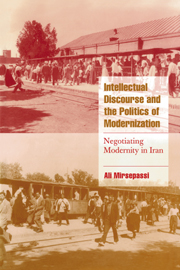Book contents
- Frontmatter
- Contents
- Acknowledgments
- Introduction: modernity and “culture”
- 1 Western narratives of modernity
- 2 Reconciling with the West's Other
- 3 The crisis of secularism and the rise of political Islam
- 4 Islam as a modernizing ideology: Al-e Ahmad and Shari'ati
- 5 German intellectuals and the culture of modernity
- 6 The tragedy of the Iranian Left
- 7 Modernities of our time
- Notes
- Bibliography
- Index
7 - Modernities of our time
Published online by Cambridge University Press: 06 October 2009
- Frontmatter
- Contents
- Acknowledgments
- Introduction: modernity and “culture”
- 1 Western narratives of modernity
- 2 Reconciling with the West's Other
- 3 The crisis of secularism and the rise of political Islam
- 4 Islam as a modernizing ideology: Al-e Ahmad and Shari'ati
- 5 German intellectuals and the culture of modernity
- 6 The tragedy of the Iranian Left
- 7 Modernities of our time
- Notes
- Bibliography
- Index
Summary
The “Islamic mind”
Having observed the extraordinary lengths to which Orientalists will go in order to sculpt an imagined model of the “Islamic mind,” with extended forays into premodern history, ancient textual sources, and elaborately based ontological arguments designed to evoke a causal relation between some primitive impulse and an entire people in the context of the modern world, one is tempted to demand why they refuse to merely speak with this other, rather than consistently imagining its voice. Given that modernity has been the defining factor in shaping the issues and conditions of the contemporary Islamic world, surely it is more productive to hear people's actual voices and read their literature in the context of modernity, rather than consulting exclusively premodern texts in order to construct a teleological model of Islamic motivation in the modern world. The difference between these two approaches constitutes a fundamental question of methodology in analyzing the peoples and cultures of Islamic societies. The Orientalist approach betokens an assumption that the voices of contemporary Muslims – of whatever political shade – can only be less valuable and informative than whatever the Orientalist has dreamed up and presented beforehand as the essential Islamic mind. The voices and literature of contemporary Muslims could do no better than to conform to what the Orientalist already knows from “expertise.” To criticize this method is surely second to letting it stand in juxtaposition with people's actual voices, whereby the inevitably greater complexity of human reality will override the chimera nurtured in the Orientalist tradition. In recent years a more liberal current in Islamic studies, critical of Orientalism, has tried to focus on contemporary Middle Eastern and Islamic societies.
- Type
- Chapter
- Information
- Intellectual Discourse and the Politics of ModernizationNegotiating Modernity in Iran, pp. 180 - 193Publisher: Cambridge University PressPrint publication year: 2000

